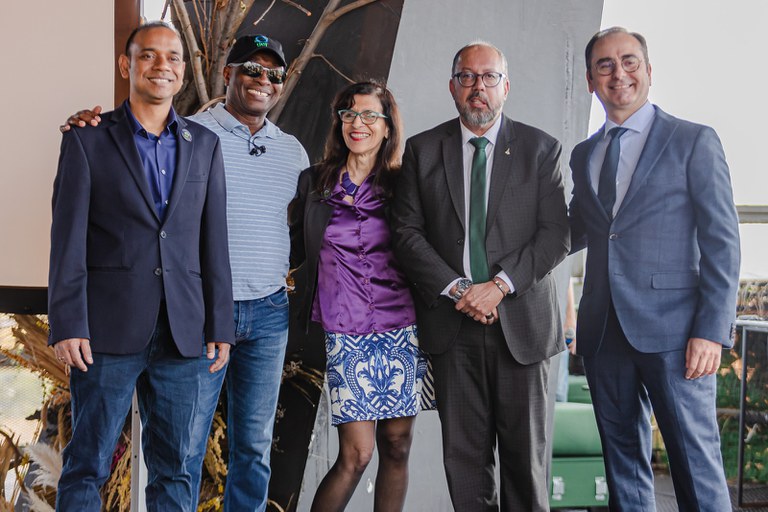The main results achieved in the Federal District by the initiatives implemented by the CITInova International Cooperation Project were presented, on Friday (30), in Brasilia, to the consultants of the Global Environment Fund (GEF). The group of about 90 people visited the implementing partner agencies and the places where the interventions were implemented.
CITInova aims to improve decision-making and citizen participation in urban development challenges in Brazilian cities. The project, which began in 2018, is in its final stage. It is coordinated by the Ministry of Science, Technology and Innovation (MCTI), and supported by the United Nations Environment Program (UNEP). In the Federal District alone, R$35 million has been invested.
For MCTI, the implementation of the project encouraged the incorporation of the sustainable cities agenda into the structure of the portfolio, which will continue research, development and innovation actions, given the importance of urban agglomerations. According to the IBGE, in 2022, urban agglomerations in Brazil were home to 124.1 million people. The number represents 61% of the Brazilian population.
According to MCTI’s Secretary for Policy and Strategic Programs, Marcia Barbosa, the deliveries carried out by the project in Brasilia emphasize improvements in water quality and the environment. “We are learning that a sustainable environment is important to people’s lives. Together with the residents, we are building solutions to improve the quality of life in collaboration with the government,” he said.
She also expressed her relief at the news that the Federal District government is continuing the projects. “The good news is that although the first phase was funded by the Global Environment Facility, the country is now taking over the project and will continue it, recognizing that sustainability must be central to this beautiful city,” he said.
On another front, MCTI is working to disseminate and scale up technologies that have been tested and implemented in pilot projects in Brasilia and Recife. Filtration Gardens, for example, built to clean the waters of the Kafuku River, a tributary of the Capiparibe River, in the capital of Pernambuco, have proven that a nature-based solution can be replicated in other cities.
In an assessment by GEF Sustainable Cities Program Lead Aloke Barnwal, Brazil is a highly urbanized country with the largest biodiversity in the world. Therefore, sustainability is an important factor. Unsustainable urbanization can lead to severe environmental degradation. Therefore, it was strategic for the GEF to support Brazil through its Sustainable Cities Programme.”
It assesses that Brasília shows leadership in climate and nature and, therefore, has been chosen by the Fund to promote action. “We intend to make Brasilia an example of a sustainable city with an impact that can be replicated in many cities in the country and in the region,” he said.
According to the Minister of the Environment of the Federal District, Antonio Gutemberg Gomez, all the funds corresponding to the investments made through CITInova were provided by the local government. In presentation to board members, report ongoing joints to give continuity and extend project actions.
Regarding SISDIA, we are coordinating with various government sectors to move forward with the system and implementation. Regarding agroforestry regulations, we are talking to the government sectors responsible for the agricultural region to continue working towards improving the knowledge gained and expanding the scope of the systems. In terms of watershed protection, Sima is already working on a plan to permanently reconfigure spring areas and conservation areas and a plan with annual targets, in order to turn this initiative into a state policy,” he explained during a speech.
Find out about the results of the project in the Federal District
About the CITinova project
Integrated Planning and Technologies for Sustainable Cities: is a multilateral project, funded by the Global Environment Facility (GEF) and implemented by the United Nations Environment Program (UNEP). The Ministry of Science, Technology and Innovation (MCTI) is responsible for its implementation, in partnership with: the Secretariat of the Environment of the Government of the Federal District (SEMA/GDF) and the Center for Management and Strategic Studies (CGEE), in Brasilia; Recife Agency for Innovation and Strategy (ARIES) and Porto Digital Management Center (NGPD), in Recife; The Center for Management and Strategic Studies (CGEE) and the Sustainable Cities Program (PCS) for national knowledge platforms. The project is divided into three components: Integrated urban planning. investing in innovative technologies; and the Sustainable Cities Platform. The project has mobilized a global value of approximately R$113 million (US$22.6 million) in GEF funds for initiatives in Recife and Brasilia, and to develop national platforms.
See photos from the event here connection.

“Hardcore beer fanatic. Falls down a lot. Professional coffee fan. Music ninja.”






More Stories
The law allows children and adolescents to visit parents in the hospital.
Scientists pave the way for the emergence of a new element in the periodic table | World and Science
Can dengue cause hair loss? Expert explains how the disease affects hair